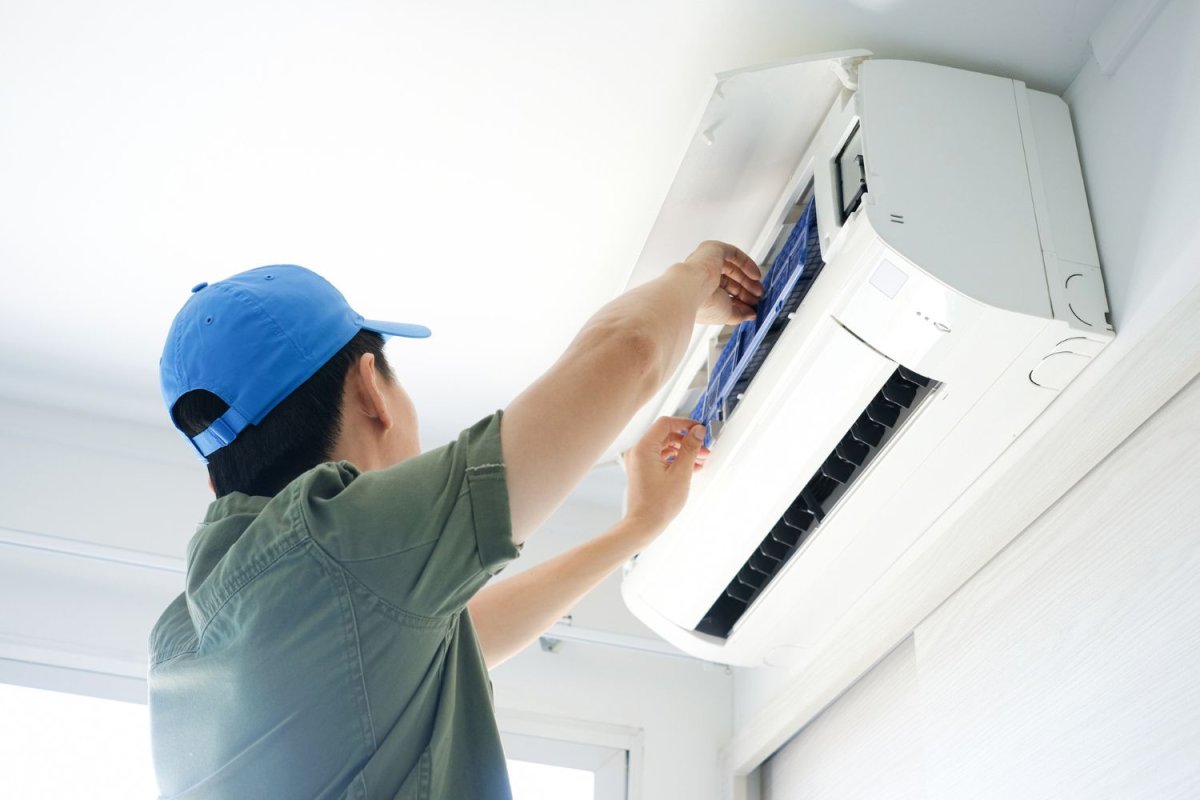We may earn revenue from the products available on this page and participate in affiliate programs. Learn More ›
- Typical Range: $100 to $610
- National Average: $369
Air conditioning circulates, filters, and cools a home’s air. If an AC unit begins to break down or stops working entirely, the effects are quickly noticed. When having an air conditioner repaired, homeowners can expect to pay between $100 and $610, with an average repair cost of $369. Read on to gain a deeper understanding of what factors influence AC repair cost, signs that point to a potential repair, and when it’s time to call in a professional AC tech.
Factors in Calculating AC Repair Cost
The average cost to repair an air conditioner ranges from $100 to $610, depending on repair type, the age of the unit, and even geographic location. When trying to determine where their air conditioner repair cost will fall within this range, homeowners should consider the following factors that strongly influence the final estimate.
Repair Type
Replacing an AC unit can be expensive, which is why repairs are almost always considered first. When it comes to estimating AC repair prices, the type of repair is a large determining factor. Some repairs can be completed in only a few hours, while others require several days and possibly more than one professional.
A bad thermostat can cause a unit to run continuously or shorten a unit’s cycle. A faulty thermostat repair costs on average between $60 and $440. A failing blower can’t push cool air into a system’s ductwork. Luckily, this repair can cost as little as $150, though it could range from $400 to $700. A deteriorating AC capacitor can be a more expensive issue to fix. This is the component responsible for providing additional energy to start the unit and keep it running during a cycle. AC capacitor repair generally costs between $120 and $475.
Another common AC repair type is a recharge, typically done after a leak is repaired. Having the Freon in an AC unit recharged or refilled can cost between $100 and $350. Other types of AC repairs include fan motor repair (ranging from $200 to $500), condenser repair (ranging from $275 to $600), and coil repair (ranging from $200 to $500).
Unit Type and Size
There are multiple types of air conditioning units. As one can imagine, they all have different average AC repair costs and ranges. For example, a window cooling unit costs between $50 and $125 to repair. A portable air conditioner has a similar repair cost range of $80 to $250. These types of cooling units are usually more affordable to repair because they are smaller and have low-cost components.
When it comes to central air units, homeowners can expect to pay between $100 and $500 for repairs. These units are typically more complicated to diagnose and repair, hence the higher repair cost. The same concept applies to other types of AC units, including ductless mini-split AC units (ranging from $750 to $900), swamp coolers ( ranging from $125 to $500), and HVAC package units (ranging from $300 to $500). Typically speaking, if a unit is larger, less common, or houses multiple components in comparison to other units, its repair cost is likely to be higher.
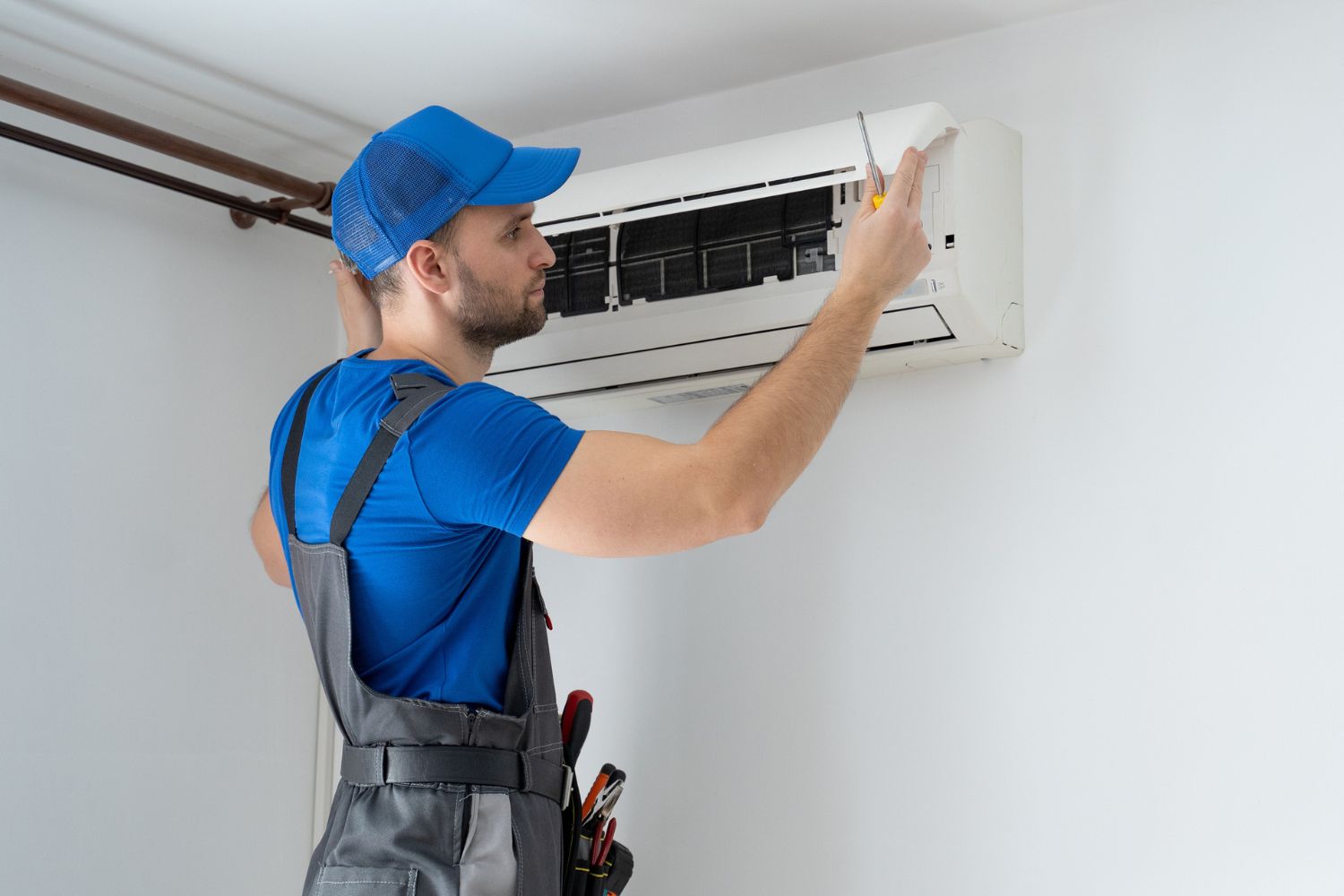
Unit Age and Condition
Units that are older or in poor condition will cost more to repair than a new unit in good condition, and there are several reasons for this. First, an older unit may be discontinued. This makes it more difficult to track down replacement parts. Newer techs may not be familiar with the model, making it more difficult (and possibly expensive) to find the best HVAC company with the right experience to repair an older unit.
Units in less-than-fair condition can cost more to repair for a couple of reasons. It’s more likely that a unit in poor condition wasn’t properly maintained. So if one component is starting to fail, additional components are also likely to break down soon, if they aren’t already on their way out. Also, units showing signs of deterioration may be better off being replaced. A replacement will always cost more than a simple repair.
Unit Brand
Just like cars or clothing, the brand behind an AC unit can have an effect on its initial cost and repair fees. There are value brands on the market, like Bryant and American Standard; there are also more expensive brands like SpacePak, York, and Armstrong.
For example, a Bryant AC repair can cost between $200 and $600, while a SpacePak repair is likely to cost between $500 and $2,000.
When it comes to less-expensive brands, homeowners can save a bit during repairs. This is because the parts are a lot less expensive. However, low-cost brands are more likely to break down. While the luxury brands cost more initially, homeowners are less likely to experience problems as severe or as quickly as they might with low-cost brands.
But there’s no such thing as a fail-proof AC unit; all air conditioners will start to break down eventually. So while brand is an influencing factor, homeowners should also consider other features offered by a manufacturer beside price points, specifically warranties. A unit with a long warranty can save money over time, even if it has a higher initial price tag.
Unit Accessibility
Not all AC units are easily accessible. A unit that requires a bit more flexibility to repair will cost more than an easily accessible one. For example, an outdoor AC unit placed against the side of a house in an open and flat area of the yard is easy to access. Newer models tend to be easier to repair as well, saving a technician time (and the homeowner labor costs).
If the unit in question services multiple areas, like a condo building, accessing the unit can be more difficult. The same can be said for older homes where the previous owner paid to install an AC unit decades after original construction. Units in tight or hard-to-reach spaces (including those that can only be reached by several staircases) take more time to diagnose and repair, leading to higher costs.
Labor
Besides repair type, labor is one of the biggest factors when trying to determine air condition repair cost. Most technicians charge a basic service call fee. This covers their time to travel and diagnose a failing AC unit. Then there’s the cost of replacement parts once the problem has been identified. Then the labor is tacked on. Basic service fees cost between $75 and $200 for the technician to come out and diagnose the issue. Parts can range from a few dollars to several thousand dollars. Labor fees also greatly vary, with some techs charging as low as $75 per hour or as high as $150 per hour. Some techs charge different hourly rates based on the scope of the job, making it difficult to estimate an AC repair cost based on the expected repair time alone.
Geographic Location
Geographic location can affect air conditioner repair costs. This is because average repair rates fluctuate throughout the country due to different temperature ranges, available technicians, and demand. A city with dozens of available repair companies that rarely sees heat waves (meaning demand for techs is low) is likely to have lower average repair costs compared to an area with only a few repair companies and scorching temperatures (which is likely to cause high demand).
For example, the average HVAC repair cost in New York is $500, while homeowners in New Mexico will pay an average repair price of $365. Florida and Texas come in even lower at $340 for both locations, while residents of Pennsylvania pay a bit more at $400.
The difference isn’t astronomical, but it helps homeowners to know that where they call home will have an effect on their AC repair cost.
Seasonality
Finally, the time of year will also have a direct impact on the expected cost to repair an AC unit. Just as location and demand can influence cost directly, so do the seasons, and the reason is the different temperatures.
When temperatures are low in late fall, winter, and early spring, homeowners are probably not using their air conditioners. Even if there is a problem lurking within the unit, it’s unlikely to be obvious. But once those same homeowners start cranking down the thermostat in the summer, issues are likely to come to a head. The sudden increase in repair calls can lead to higher repair costs, including emergency fees.
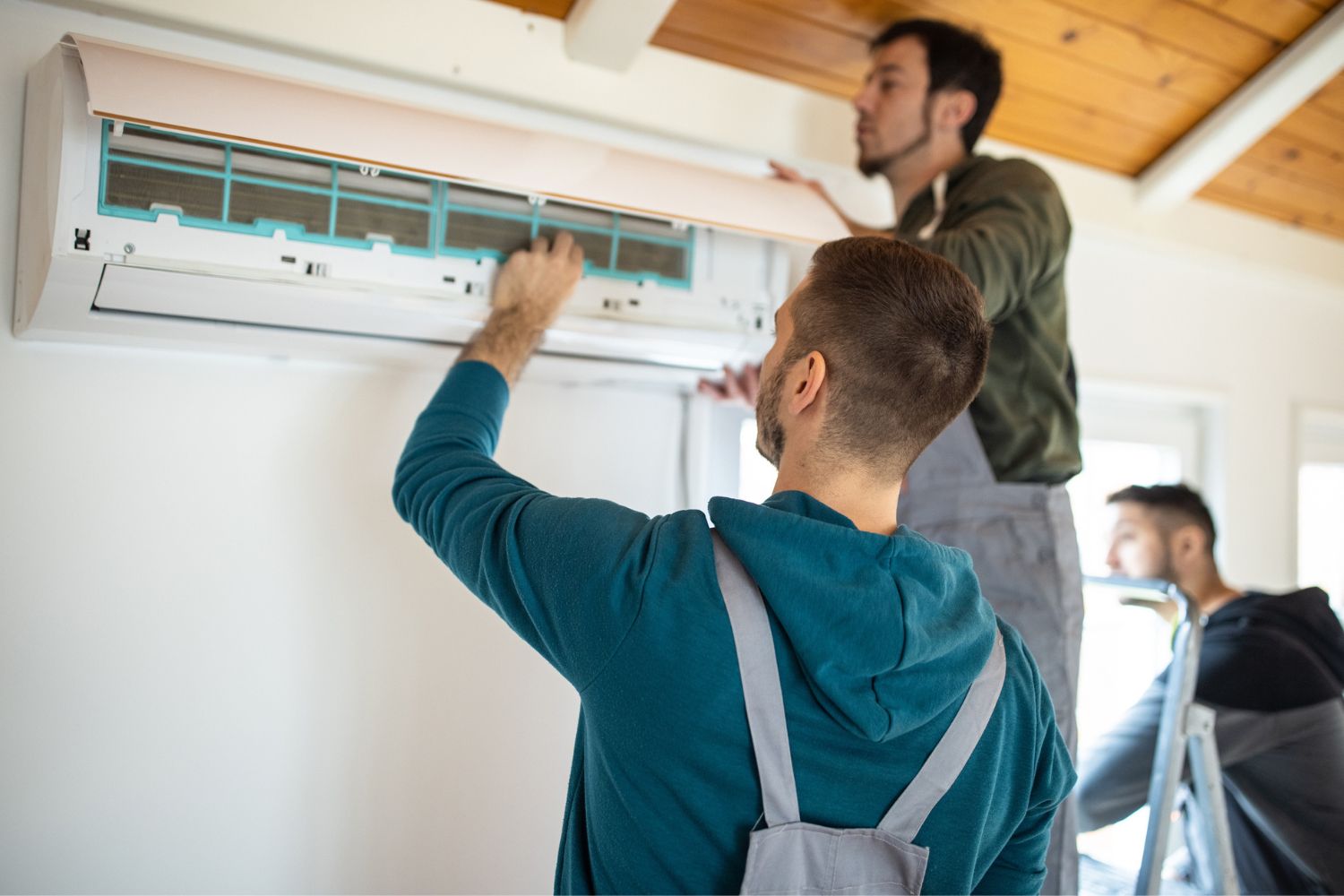
Additional Costs and Considerations
There are a few other additional costs and considerations homeowners should know about when trying to navigate the potential cost of AC repair. These include warranties, emergency fees, and the decision of whether to simply repair or fully replace a malfunctioning unit. Here’s how each consideration affects the total cost of AC repair.
Repair vs. Replacement
Replacing an air conditioning unit isn’t cheap. In fact, the cost to replace an AC is between $2,500 and $7,500. For those looking at replacing both the AC and furnace, a full HVAC system replacement costs around $7,000 on average. Sometimes ductwork needs to be replaced alongside an AC unit. This can run between $6,000 and $12,000.
With a potential replacement price tag approaching $20,000, it only makes sense that most homeowners would want to consider repairing their unit before shopping for a new unit. The good news is that in many cases, repair is an affordable option that can get a unit back up and running.
However, there are some scenarios that would warrant a homeowner considering AC replacement, even if the potential price is a concern. These include:
- A unit older than 10 years
- A unit using R-22 Freon
- A unit that’s already been repaired several times
Homeowners unsure of which option to choose should speak to their repair tech, getting several opinions if needed. But one rule of thumb to use is to replace a unit if the repair cost is 50 percent or more of the cost of a new AC unit. Additionally, homeowners can use the following equation to help them decide.
Repair cost multiplied by the age of unit = X
If X is more than $5,000, a replacement is likely the best option.
Warranties
Warranties can help lower the cost of AC repair or replacement. For example, an AC condenser replacement costs up to $4,000 if not under warranty. If the unit is under warranty, though, homeowners can pay as little as $300 for the same repair. Replacing an AC condenser fan can cost $200 to $700 if out of the warranty period, or as low as $100 if covered.
There are two types of warranties that may help cover AC repair cost: a manufacturer’s warranty and a home warranty. When making a claim on a manufacturer’s warranty, homeowners should have the make and model of their AC unit available, along with their warranty information. An experienced tech may be able to assist with basic warranty questions, but it’s up to the homeowner to reach out to the manufacturer for details on how to take advantage of an applicable warranty.
A home warranty is ideal for homeowners who bought a home with an AC unit installed under the ownership of the previous owner. In this case, any applicable warranty the AC unit was covered under during installation does not transfer to the new homeowners. A home warranty policy from one of the best home warranty companies (like American Home Shield or AFC Home Club) can help homeowners handle repair costs if necessary; homeowners will typically only need to pay a service call-out fee, and the repair cost will likely be covered by the home warranty, but check to see if there are any conditions that need to be met in order for the warranty to apply, such as annual maintenance.
Emergency Fees
It’s not uncommon for an AC technician to receive an influx of calls during a heat wave. When there are more repair jobs than available techs, tacking on emergency fees is one way the pros make sure they’re taking on the top-priority jobs first. Emergency fees can apply to middle-of-the-night calls, weekend calls, or calls during a busy season. Homeowners who can’t wait for their AC unit to be repaired (either due to personal preference or because of young children, elderly family members, or pets living in the home) can expect to pay between $160 to $250 per hour in emergency call-out fees. These fees also apply to more serious emergencies, such as a leaking AC unit. This is in addition to the cost of any required parts and labor.
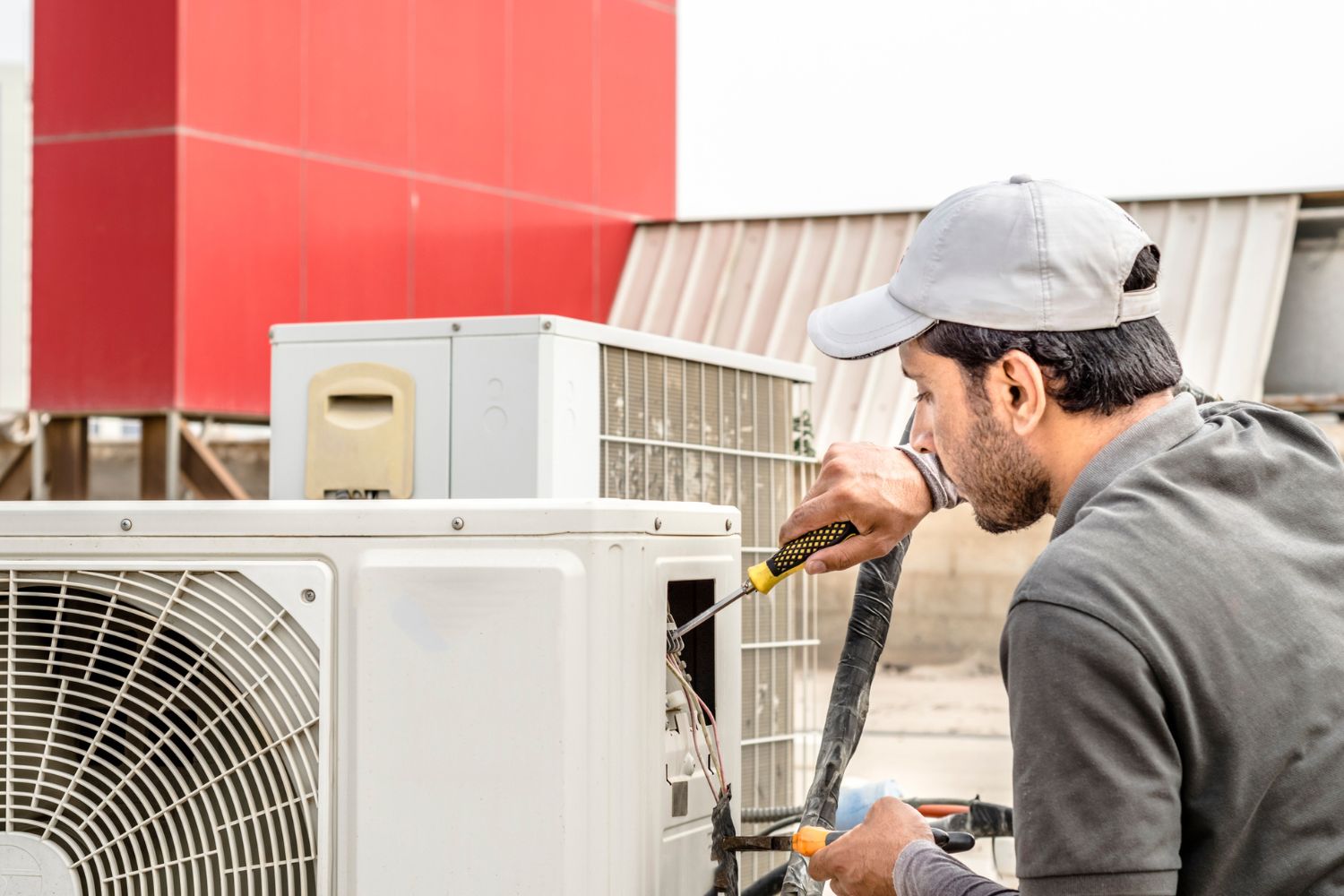
Types of AC Repair
Between unit types, brands, and designs, there is a seemingly endless list of possible AC unit repair jobs that technicians complete. Homeowners experiencing issues with their air conditioning can expect the type of repair needed to greatly influence the total repair cost. Listed below are some of the most common types of AC repair jobs to give homeowners an idea of what to expect when it comes to the signs of a failing unit, possible repairs needed, and what the job may cost.
Compressor Replacement
A compressor is known as the “heart” of an air conditioner. It is the power unit of the system, putting the refrigerant under high pressure so it can cool down before entering the condenser. It’s a vital component, which often comes with an expensive repair cost. Signs of a failing compressor include loud noises coming from the unit and air flowing through a home at a warm temperature.
When determining the cost of AC compressor replacement, the first factor to consider is whether it’s under warranty or not. A compressor under warranty costs between $600 and $1,200 to replace, while replacing one out of warranty can run as high as $2,500.
Homeowners should also know that not all compressors need to be replaced right away. Some can have their life extended with a compressor hard start kit. These kits provide an extra boost on startup, helping a failing compressor still get the job done. A kit won’t help a compressor last forever, but at a cost of $100 to $270, this can be a great option for homeowners who can’t foot the bill of a full replacement just yet.
Freon Leak
Freon is a noncombustible gas that is used as a refrigerant in air conditioning applications. It continuously goes through an evaporation process to help an AC unit produce cool air. Freon doesn’t burn up or get “used up” by a unit. Instead, it tends to escape a unit through small leaks that develop from poor maintenance or simple wear and tear.
Freon can be added to a unit once any obvious leaks are repaired. To have a leak repaired and a unit refilled with Freon, homeowners can expect to pay between $200 and $1,500. This is a wide range, and the final cost depends on how severe the leak is, how difficult it is to reach and repair, what replacement parts are needed, and how much Freon is needed. Freon is charged per pound, with a range of $125 to $150 per pound. Larger units will likely cost more to refill, and units with leaks that went undetected for an extended period will likely cost more to refill.
Air Handler Replacement
Air handler issues are commonly seen in systems older than 10 years. Signs of a failing air handler (a metal casing containing an evaporator coil and a blower fan that circulates a home’s air through the ductwork) include limited amounts of cool air flowing out from a vent or a foul odor circulating when an AC unit is turned on. This is likely from moisture building up within the system.
The average cost to replace an air handler is between $700 and $5,600 for both the part and installation.
Condenser Replacement
An AC condenser either collects or releases heat, depending on the time of year. It’s a crucial AC component that requires immediate attention if an issue is suspected. Having a warranty in place can be very helpful when it comes to replacing a condenser. With a warranty, homeowners can expect to pay between $300 and $1,200 for labor. But if a condenser is not under warranty, the price range jumps to between $1,200 and $4,200. In the case of older units, rather than repairing a unit that has a broken condenser, it may make more financial sense to replace the unit.
Duct Replacement
When updating or upgrading an AC unit, ductwork may need to be replaced as well. If the entire system is being replaced, homeowners can expect to pay between $1,400 and $5,600 for just the ductwork, depending on the size of the home and the number of vents being replaced. To help narrow down this wide range, ductwork is typically $25 to $55 per linear foot. This can be an expensive cost to tack onto an AC unit replacement, but it may help to know that ductwork typically lasts 10 to 20 years before needing to be replaced.
Blower Repair
The blower motor can be found in the indoor air handler. It’s responsible for pushing cool air through the ductwork connected to the unit. When it stops working, it can be impossible for cool air to move throughout a home. Having a warranty on the air conditioning unit can help bring down repair costs. A repair with a warranty averages between $200 and $400 for labor. If not under warranty, homeowners can expect to pay between $300 and $900 to repair this crucial AC component.
Expansion Valve Replacement
Also known as the TXV, TEV, or the service valve, a thermostatic expansion valve is responsible for the amount of coolant that enters an AC unit’s evaporator. Homeowners can expect to pay between $300 and $500 to replace an expansion valve in their AC unit.
Fuse, Circuit Breaker, or Relay Replacement
A fuse replacement can cost between $75 and $300. These are similar to car fuses and can blow if they get overloaded. The good news is that this type of repair is quick and not likely to rack up excessive labor fees.
A relay turns on an AC unit’s outdoor condenser unit. It’s an affordable replacement part, falling between $10 and $30. Once professional installation costs are added, the total comes in between $100 and $300.
Thermostat Replacement
A damaged thermostat isn’t an AC unit component that can be ignored. A bad thermostat is unable to monitor the temperature inside a home, resulting in a unit that either runs constantly or never starts up a new cooling cycle. Without a properly running thermostat, it’s impossible to adjust the temperature inside a home. Thermostat repair costs between $60 and $440, which includes parts and labor. The main difference between pricing is whether or not the thermostat is a basic programmable design or a smart design, with the latter costing more to repair.
Homeowners should also know that it is sometimes better to replace a thermostat rather than repair it, especially for an older unit. A professional AC tech should be able to make the proper recommendation between a repair and a replacement.
Capacitor Repair
Air conditioners typically need an extra boost of energy when starting up or completing a cycle. A home’s circuit board can’t always provide this additional energy, and this is where a capacitor comes in. It reserves electrons to supply that extra jolt when a unit kicks on.
If a homeowner is noticing warm air blowing through their vents or that their unit isn’t turning over, the capacitor could be to blame. Capacitors are an affordable component, typically costing less than $100. But they require the expertise of a professional. With labor considered, average capacitor repairs cost between $120 and $400.
Capacitors can be difficult to repair. In some situations, a repair is actually impossible. A capacitor that’s misshapen or appears to be bulging will need to be replaced.
Evaporator Coil Replacement
When it comes to air conditioner repair prices, whether a warranty is in place or not is a major determining factor. The cost of evaporator coil replacement is no exception. Homeowners who don’t have a warranty on their air conditioning unit can expect to pay between $600 and $2,000 for a replacement. With a warranty, the range decreases to between $400 and $1,000, which is the average cost of labor. Other factors that influence the cost of an evaporator coil replacement include the unit’s size, location, brand, and whether or not the coil is encased.
Circuit Board Replacement
The cost of a circuit board is another AC component that’s greatly influenced by the presence of a warranty. Without a warranty, homeowners can expect to pay between $150 and $700. But with a warranty, the range drops to between $100 and $300 for labor. Homeowners should also know that replacing an AC circuit board is almost always cheaper than choosing to repair it.
Drain Pan Replacement
A drain pan catches moisture that drips from a unit’s evaporator coil. The collection is then funneled into a drain line to keep water leaks at bay. Unfortunately, drain pans can easily crack because of expansion due to changes in temperature. Replacing an AC drain pan costs between $200 and $600, with material being a main determinant of the final AC repair estimate.
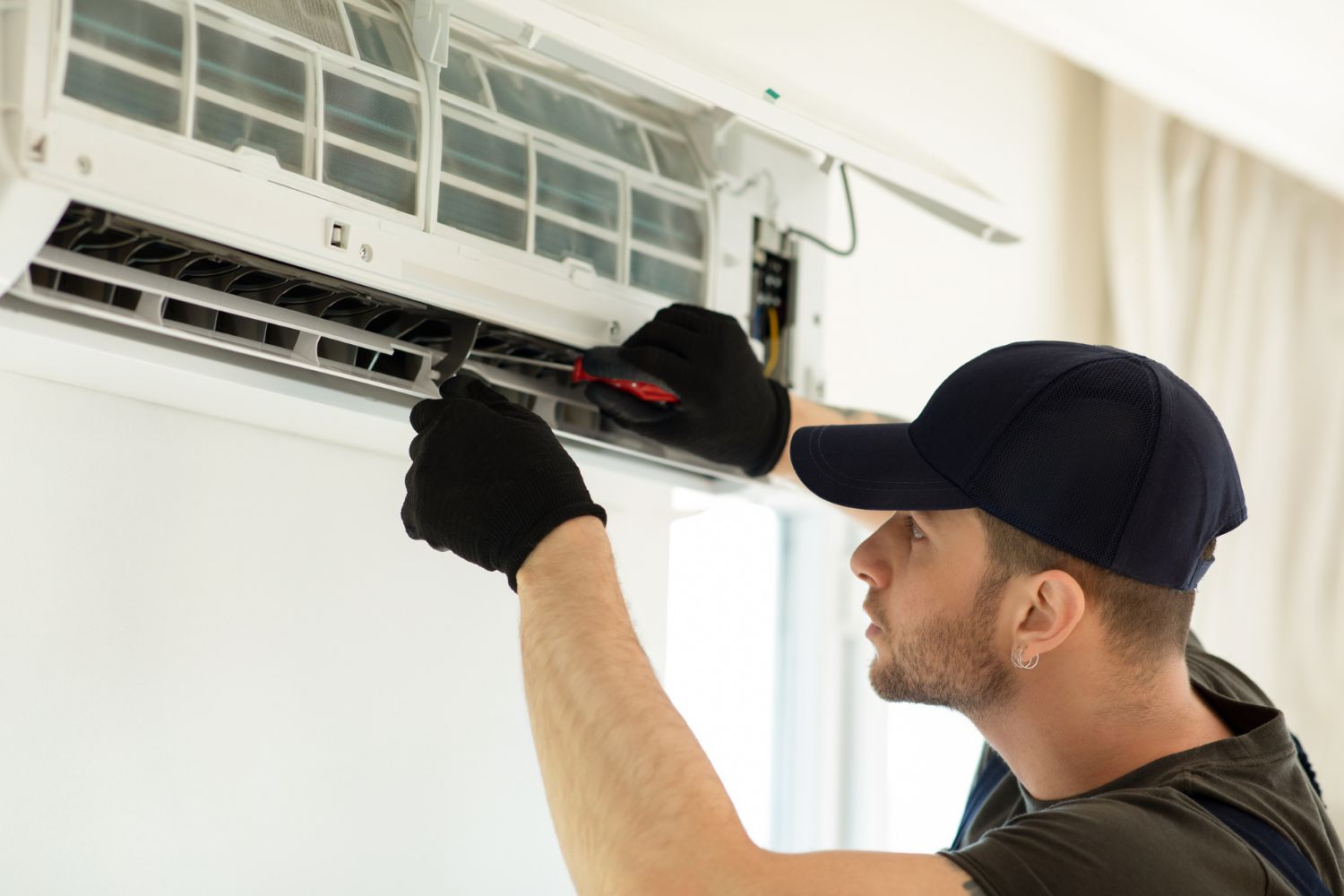
Do I Need AC Repair?
A faulty AC doesn’t go unnoticed for long. It’s also unlikely that an AC unit will start working again without intervention. Here are a few signs homeowners should be aware of that point to a likely AC repair.
Excessive Cycling
Air conditioners work in cycles: They kick on when the thermostat goes above the programmed temperature and turn off once they’ve pumped enough cool air through a home’s ductwork to bring the temperature down to the programmed level. But a unit that keeps turning on and off is said to be excessively cycling. This could be due to a clogged air filter, low refrigerant charge resulting from a leak, or the unit being the wrong size (too big or too small) for the size house it’s cooling.
Excessive Noise
Air conditioners aren’t always the quietest household appliances. But excessive noise is a sign of something gone awry. For example, a screeching or squealing noise could be a damaged blower fan. A humming noise could be due to a defective contactor relay switch. A buzzing sound should never be ignored as it could signal a refrigerant leak.
Leaking Water
If the AC is leaking inside the home, a clogged condensate drain line is likely to blame. This line can become clogged with dirt, dust, and even mold over time. Another possible culprit of a leaking AC unit is a dirty air filter. Leaking air conditioners can also be caused by damaged drain pans, a broken condensate pump, or low refrigerant. Leaking water is a sign of a damaged AC unit that should never be ignored.
Diminished Airflow
An AC unit that is blowing cool air but at a slower and weaker pace could be signaling that it’s in need of repair. Reasons behind diminished airflow include a clogged air filter, frozen evaporator coils, or leaky or blocked air ducts. It’s possible that a simple duct cleaning will be enough to remedy the issue, but a repair to the unit is likely to be necessary as well.
Burning Smell or Smoke
An AC unit producing a burning smell is a serious problem that requires immediate attention. One possible reason behind a burning smell from an AC unit is a clogged or dirty filter. This can block the airflow to the inner components of a unit, like the blower motor. This can cause the motor to work overtime and overheat. A less serious cause is excess dust. This is likely the cause if the unit has been turned on for the first time after several months of rest.
Blowing Warm Air
When an AC unit is blowing warm air, it’s certainly in need of a professional diagnosis. The list of possible causes behind an AC unit blowing warm air is almost endless, but common reasons include low refrigerant, faulty thermostat, dirty air filter, or dirty evaporator coils. Unless a homeowner has plenty of experience repairing air conditioning units, it’s best to leave this sign of a malfunctioning unit to the pros. A homeowner who tries to diagnose the issue on their own risks voiding the warranty of their appliance.
Inaccurate Thermostat
Air conditioners take their instructions from a thermostat. So when that thermostat fails to read the temperature of a home properly, the AC unit is set up to fail by either running continuously or not turning on at all. The most common reason behind a faulty thermostat is a failed sensor. Unless a thermostat isn’t reading correctly as a result of dirt or debris blocking the sensor, a replacement is likely the better option over a repair attempt.
Increased Energy Bills
Running the AC all day and all night will certainly lead to higher energy bills. But excessively or unexpectedly high bills can signal an issue with the unit. Dirty air filters can restrict airflow and increase a unit’s cycle duration, leading to higher bills. Duct leaks are another cause of increased energy bills, along with low refrigerant. Poor maintenance or an outdated unit can also cause utility bills to increase. It’s best to have a professional diagnose an AC unit that’s suspected of using more energy than it should be.
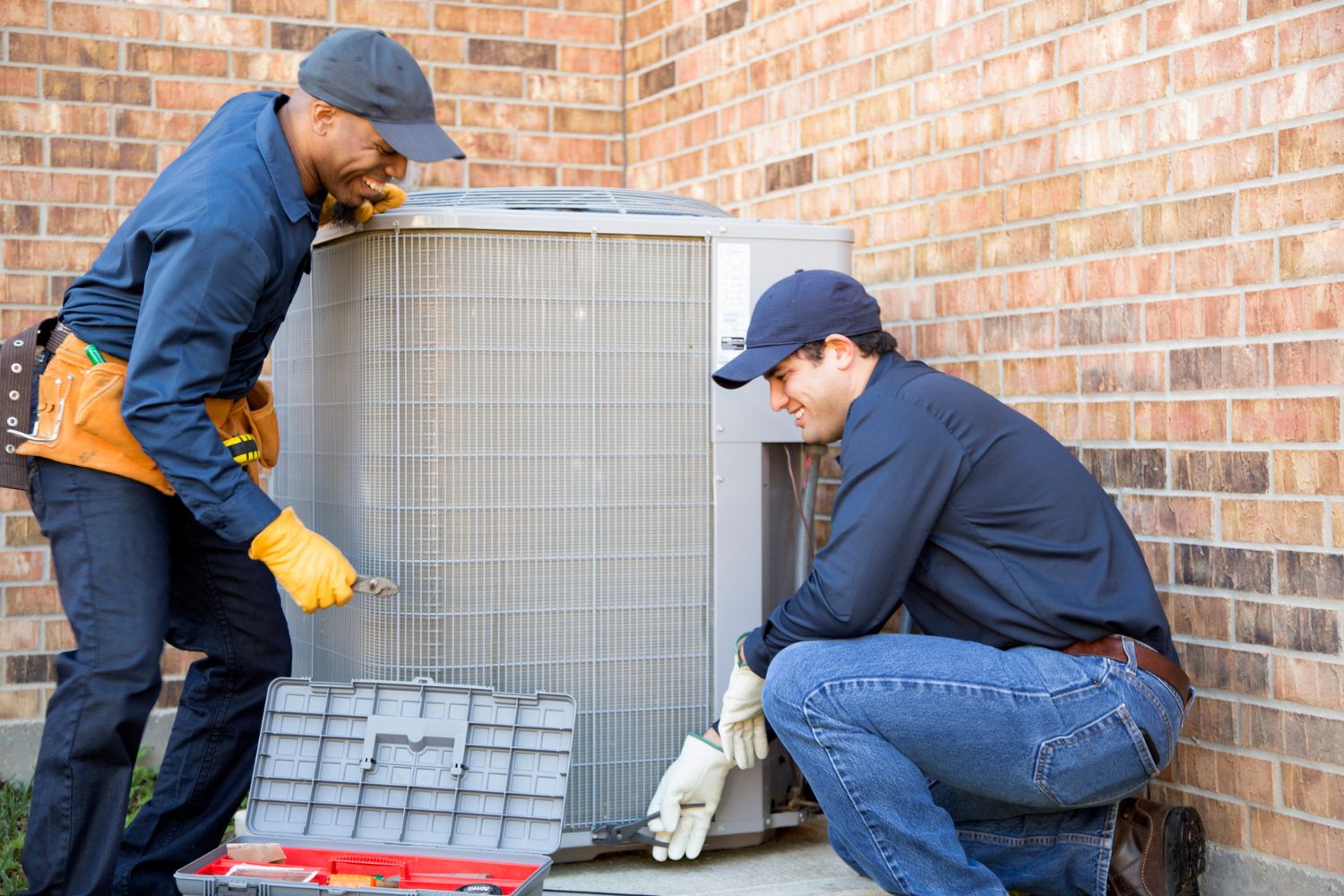
AC Repair: DIY vs. Hiring a Professional
When faced with a malfunctioning AC unit, some homeowners wonder if they can tackle the repair themselves. The answer is that it depends on the type of repair needed and how experienced the homeowner is in HVAC repair. For many homeowners, their experience is minimal. AC units are also complicated appliances and can be dangerous to work on without the right expertise. This is why just about any professional will recommend that homeowners do not take a DIY approach to AC repair, especially if the driving factor is cost savings alone.
But if a homeowner is insistent on repairing their own AC unit, there are a few jobs that are safer than others. For example, replacing air filters is a simple and inexpensive task most homeowners can safely handle on their own. Many types of filters need to be replaced every month, so being able to handle this task can save quite a bit on service fees.
Homeowners should also be able to program their smart thermostat on their own. They can also modify their air conditioner’s cooling cycle to help save on utility bills. While a pro can certainly help with these tasks, these are easy ways for a homeowner who understands the family’s routine and cooling needs to save some money.
But there are times when hiring a professional is the better option over DIY for AC repair. One such instance is annual preventive maintenance. This should be completed each spring by a professional. A tune-up of the AC costs between $80 and $100 (this can be higher if the entire HVAC system is being serviced).
An AC unit installation should always be handled by a professional; a homeowner who decides to tackle an installation on their own risks voiding the warranty. In some areas, installation of an AC unit by anyone other than a licensed professional is illegal. The exception to this is window air conditioning units, which can often be installed by a homeowner without the help of a professional (though inexperienced homeowners may choose to go with a professional for window unit installation for their own peace of mind).
Most repairs should be handled by a professional as well. AC repairs involve electricity or even Freon, which can be irritating to the lungs, esophagus, and stomach if someone is improperly exposed. Similar to installing a unit on their own, tackling a repair themselves can also leave homeowners without a valid warranty on their AC unit.
While tackling their own AC repair can certainly save a homeowner hundreds, if not thousands of dollars, the risks far outweigh the benefits. AC units are dangerous to work on without the proper experience; in some situations, it can even be illegal to tackle an install without a license. Homeowners are better off paying for the peace of mind a professional AC repair tech can offer.
How to Save Money on AC Repair Cost
Saving money is always on a homeowner’s mind. This also applies when fixing an AC unit, especially when costs can seem excessive. But an AC repair isn’t something that homeowners should skimp on. However, when it comes to saving money on an AC unit repair, there are several tips and tricks to know.
- Purchase an AC maintenance service contract to keep a unit running as efficiently as possible and catch concerns before they turn into expensive problems. The cost of HVAC service is low and can keep the unit running longer.
- Keep debris away from the AC unit, especially dried grass and leaves.
- Don’t put off repairs; the problem could get worse and lead to full replacement.
- Get several repair cost quotes to ensure the price is accurate and fair.
- Shop around for parts to get the best deal while making sure to not compromise quality.
- If purchasing a home with an AC unit already installed, purchase a home warranty to help cover potential future repairs.
- If purchasing a new unit, take the time to read the warranty and ask any questions to ensure coverage is properly applied if necessary.
- Check into financing repair parts or full replacements with the service provider to avoid high interest rates on credit card purchases.
- Change furnace filters regularly and clean ductwork annually.
- Routinely check for any signs of potential problems, such as loud noises, humming, a burning smell, smoke, leaking water, poor airflow, or warm air coming from vents.
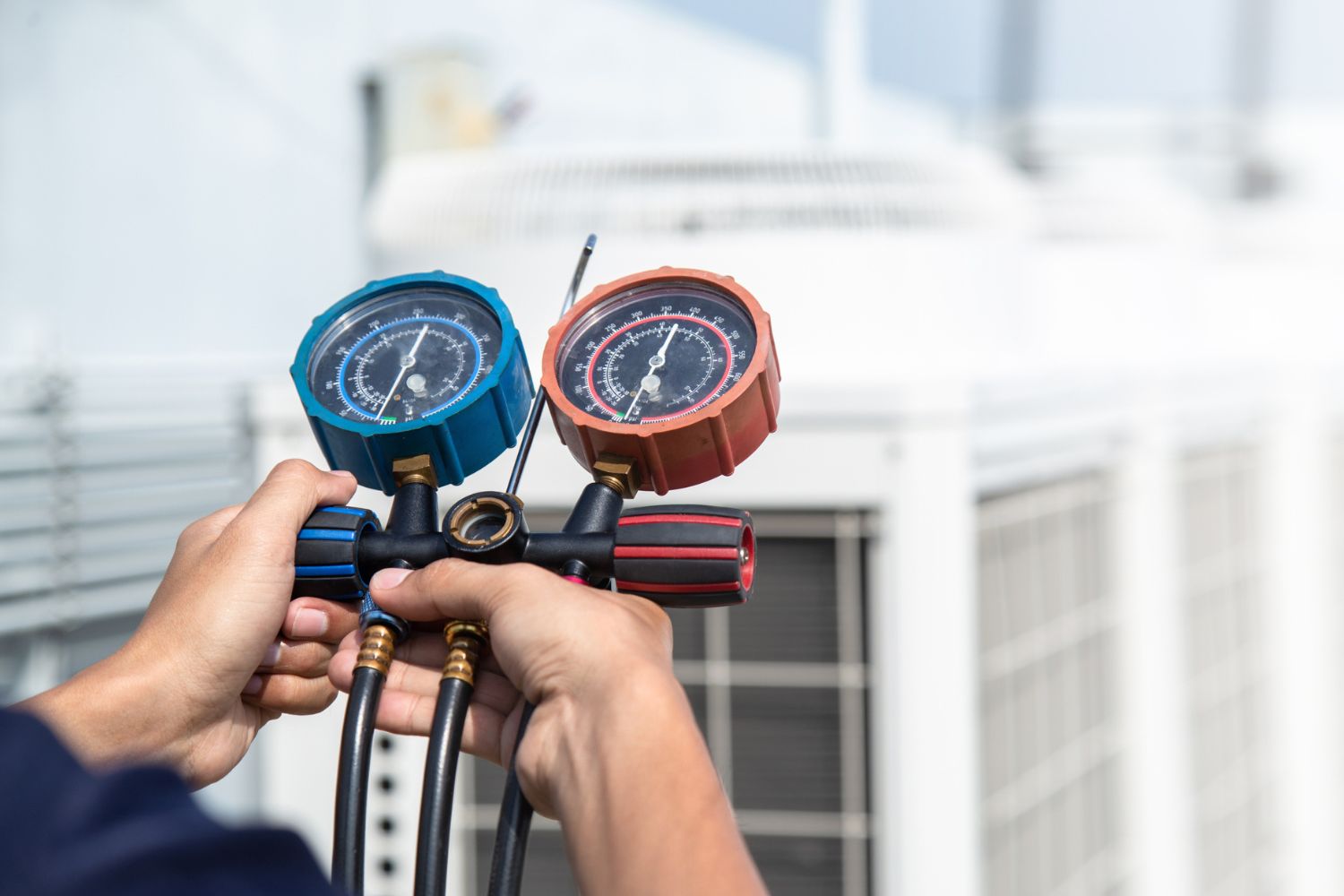
Questions to Ask About AC Repair
Hiring a professional to repair an AC unit can be challenging; finding a tech with the right experience at the right price can take some time. One way to shorten this process is to ask questions that will help the qualified candidates stand out while eliminating those who aren’t the best match for the job. Such questions include:
- Do you offer preventive maintenance?
- Are maintenance checks worth the additional cost?
- This isn’t the first repair the unit has needed. Is a replacement the better option?
- How long does a new AC unit last?
- Is there any way to cut down on high utility bills associated with running an AC a lot?
- What types of payment do you accept?
- Do you offer payment plans or financing options?
- How much experience do you have on this type of AC unit?
- How fast can the repair take place?
- Do you take away old parts or units after a repair or replacement?
- Will you check the unit for other areas of concern before starting the repair?
- Are you familiar with the unit brand? Is there another brand you recommend?
- Will a repair or replacement have an impact on my utility bills?
- What tips do you have to keep my unit running smoothly for as long as possible?
- Does my ductwork need to be replaced, repaired, or cleaned?
- Do you offer any sort of warranty or guarantee?
- What happens if you complete the repair and my unit still doesn’t work?
- Do I need to prep the area at all before the repair can take place?
- Do you charge emergency fees?
- Can you test my indoor air quality?
- Are smart thermostats worth the upgrade cost?
- What’s the best temperature to set my thermostat to so I can avoid overworking the AC unit?
- How often should the unit be serviced?
FAQs
A broken-down AC unit can make homeowners sweat, both physically and financially. The good news is that these appliances can often be repaired for a few hundred dollars and in only a few hours. While there are many factors that can raise the cost of a repair, and scenarios that could warrant a full replacement over a repair, homeowners can rest easy knowing that a professional air conditioner technician is only a phone call away.
Q. Why is my air conditioner not cooling?
An air conditioner that isn’t cooling a home can be a major cause of concern for homeowners. Luckily, there are a few things one can check before calling a professional to come and take a look. First, double-check the thermostat. It’s easy to make a mistake and switch the unit from “automatic” to “fan,” which stops the flow of cool air. Dirty filters can also cause a unit to slow down on cooling a home, along with a clogged condensation drain. If the answer to why an air conditioner isn’t cooling is anything other than obvious, calling a pro is the fastest and safest way to get the unit back up and running.
Q. How do I unfreeze an air conditioner?
An AC unit with ice is actually a sign that something serious is going on. In fact, if the AC continues to run, repair costs are likely to shoot up as more components are affected. To tackle this issue, turn the thermostat to “off,” then turn on the fan. Check the filter and replace it if needed. Keep in mind that these steps will only help remove the ice from the unit and are unlikely to fix the deeper issue. To make sure a unit isn’t in danger of shutting down completely from icing, a professional should come and diagnose the situation.
Q. How do I reset my air conditioning unit?
An AC may need to be reset due to a tripped breaker, or when it’s just not working as well as it should. Resetting an AC unit can sound scary, but it becomes manageable for even the novice homeowner once the process is broken down into smaller steps. First, turn off the unit using the thermostat. Find the home’s breaker box, shut off the unit at the breaker, and wait for at least 1 full minute before switching the breaker back to the “on” position. Then, wait at least half an hour before turning the AC unit back on using the thermostat. By waiting this long, the system has a chance to reset its internal circuit breaker. Sometimes a unit has a reset button that will take care of all these steps on its own. A reset button can be found on an outdoor unit and is usually red in color.
Q. How much does it cost to run an air conditioner for an hour?
Calculating the price of running an air conditioner can be done with a simple equation. First, find out the local kilowatt-per-hour cost. Then, find out the total amperage of the unit that will be running. Finally, make note of the power plug voltage.
Next, multiply the amps by the volts. This gives the total number of watts used. This should be divided by 1,000 to get the kilowatt-per-hour usage. Next, multiply the kilowatts used per hour by the cost per kilowatt hour.
As an example, a unit with 15 amps running through a standard power plug of 240 volts equals 3,600 total watts. This is divided by 1,000, coming out to 3.6 kilowatts used per hour. At the national average of 14.77 cents per kilowatt-hour, it costs 53.172 cents to run this AC for 1 hour.
Q. How much does it cost to fix an air conditioner?
The national average AC repair cost is $369. Several factors, including unit size, age, type of repair needed, and warranty details, affect how much this repair costs, resulting in a range of $100 to $610. Homeowners should also know that in some scenarios, replacing an AC makes more financial sense than attempting a repair.
Q. How much does it cost to replace a coil in an air conditioner?
On average, it costs $1,300 to replace a coil in an air conditioner. The biggest determining factor is unit size. AC units are measured in tons, and replacing a coil in a 3-ton unit typically costs around $825. Replacing a coil in a 5-ton unit can be as much as $1,075. These costs are only for the replacement part itself and do not include labor. Labor prices can tack on an additional $700 on average. Other factors that influence the final price include ease of access, the brand of the unit, and whether additional repairs are required.
Sources: Angi, HomeAdvisor (1 and 2), HomeGuide, Fixr, Sears Heating and Cooling, Central Heating and Air Conditioning
